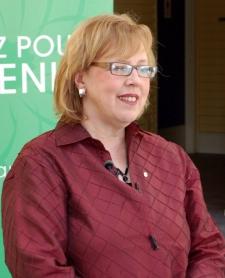After failing to make a breakthrough in the 2008 federal election, the Green Party is looking at other ways to push its agenda coming out of last month’s convention, says leader Elizabeth May.
Party members and candidates from across the country gathered in Pictou, Nova Scotia in February for the party’s biennial policy convention. They debated and passed new policies for the Green platform.
“It was a very inspiring convention in terms of the unity of the party,” says May.
May says the Greens have become “a more mature party after one big election,” which saw the Greens increase their share of the vote to 6.7 percent. Last year’s election also saw another Green milestone: May was allowed to participate in the televised leaders’ debates, a first for the party. But the Greens failed to win a breakthrough seat, and in the months following the election, the party has dropped off the mainstream media’s radar.
Members debated policy at the convention, but the near constitutional crisis and potential for a coalition government last November drove some of the discussions.
“There’s been a resolution passed that says that the Green Party of Canada is basically open to cooperation,” May says. “We’re really enshrining something that we’ve always known we would do, but say look, if another party or parties want to have some form of collaboration short of merger, it’s up to council, and they must make a determination.”
The council is what governs the party, and not the leader.
“There were good discussions about our role in politics, the purpose in having the Greens and setting the bar for policies that will make a difference for our survival on the planet but also improve social justice,” May says. “If we got an opportunity for significant advance on one of our policies by working with a different party, we have to not only embrace it, but we have to be ready for it and have the governance tools to say we’re doing something that’s perfectly within our mandate as a political party.”
Other policies discussed included things like the ethical treatment of farm animals, the institution of the “Tobin tax” on foreign currency transactions, and the party’s position on the population crisis.
“I think we’re the only party that has a population policy at all,” May says. “But we’ve improved on it to say that look, we know we’ve got a problem but the solution is in education and empowerment of women and girls around the world.”
Although there were no new resolutions passed around queer issues, May says the party’s existing platform is thorough.
“I think our policies passed in this area — I hope — are quite complete, and I hope they’re the best of any party,” says May. “Laurie Aaron, who used to work at Egale, was our executive director for a while, and we went over everything then to make sure that we were up to snuff.”
Those platform commitments include adding gender identity and expression in the Canadian Human Rights Act and the Criminal Code in hate sentencing and propaganda provisions, repealing the anal sex clause of the Criminal Code, and ending the targeting of queer bookstores and businesses by the Canada Border Services Agency.
As for her own leadership, May says that while there is no provision in the party constitution for a leadership review to be moved from the floor, none came.
She says she still plans to run in Central Nova, despite discussion that the party may ask her to run in the potential New Westminster-Coquitlam by-election, as NDP MP Dawn Black announced her intention to resign and run in the provincial election in BC.
“My riding is Central Nova,” May affirms. “I don’t want to be asked to move, and if the party asks me to move, and people in the party are looking at that, I’m particularly not inclined to go across the country. But you never know — there’s sacrifices you make for your party. The other dynamic is we don’t know if there will be a by-election there, and if there’s a general election first, the last thing I want to do is suddenly start thinking about going somewhere I’ve never lived before. I want to stay with where I live — that’s my first choice.”
But with rumours that Peter MacKay might be up for the position of Secretary General of NATO, the Central Nova seat may become vacant sooner than expected.
“Honestly, I don’t know,” May says with a laugh. “I don’t think anyone does. I think it’s a long shot, but it would certainly justify my choice of running in Central Nova.”


 Why you can trust Xtra
Why you can trust Xtra


